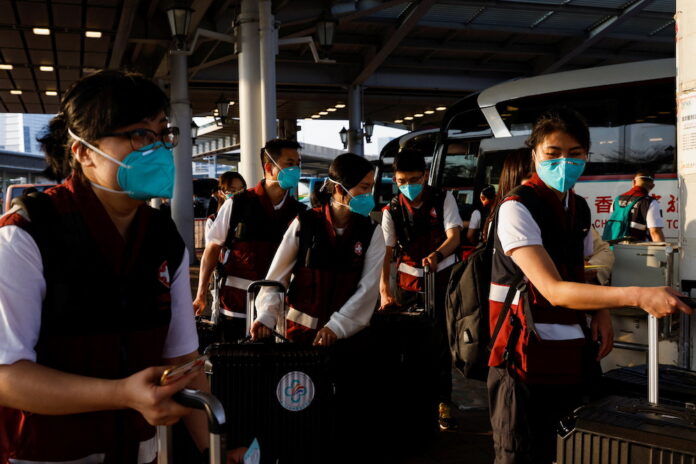Medical workers from China arrive at Shenzhen Bay Port during the Covid-19 pandemic in Hong Kong, China March 14, 2022. — Reuters pic
HONG KONG, March 18 — Hong Kong’s leader on Friday warned against making “divisive comments” about mainland medics helping battle the city’s deadly Omicron-fuelled wave after questions of accountability were raised by the press.
China this week sent about 400 healthcare workers to bolster the ranks of Hong Kong’s anti-pandemic staff, a move that fuelled questions over the waving of working licences for foreign doctors and medical accountability.
Local station Now TV drew the ire of Beijing supporters on Wednesday after its reporter asked how patients’ complaints about mainland medics would be handled.
The channel issued an apology the next day after a pro-Beijing think tank called for the reporter to be fired and accused her of possibly breaching the city’s sweeping national security law.
Imposed in 2020 by Beijing after massive and at-times violent democracy protests, the law criminalises dissent and has ensnared nearly 170 people — including journalists.
When pressed on the incident, leader Carrie Lam dismissed the idea the attacks on Now TV’s reporter were a sign of waning press freedom.
“Why do we want to make all this fuss and make divisive comments?” Lam said at a Friday press conference.
She pointed out the tough working conditions the medics face in Hong Kong — travelling in a closed-loop bubble and toiling in makeshift hospitals far from their families.
“So please, you can ask questions to understand more about their deployment, their contributions and maybe their feelings in time to come, but don’t make it into another political issue or relate it to media freedom,” she said.
In a statement, the Hong Kong Journalists Association said it was worrying the Now TV reporter had been attacked for doing her job, adding her employer’s apology would “undoubtedly worsen the self-censorship of its editorial staff”.
Hong Kong’s news industry has long been known for scrutinising officials in ways unimaginable in mainland China, where local media is controlled by the state and foreign news outlets are heavily restricted.
But two of Hong Kong’s most outspoken outlets — Apple Daily and Stand News — closed last year after being raided, while another was shuttered after its editors said they “no longer feel safe to work”.
Lam’s administration has been widely panned over its unclear public messaging and handling of Hong Kong’s fifth Covid-19 wave, which has seen nearly a million cases recorded and about 5,000 deaths in less than three months. — AFP


